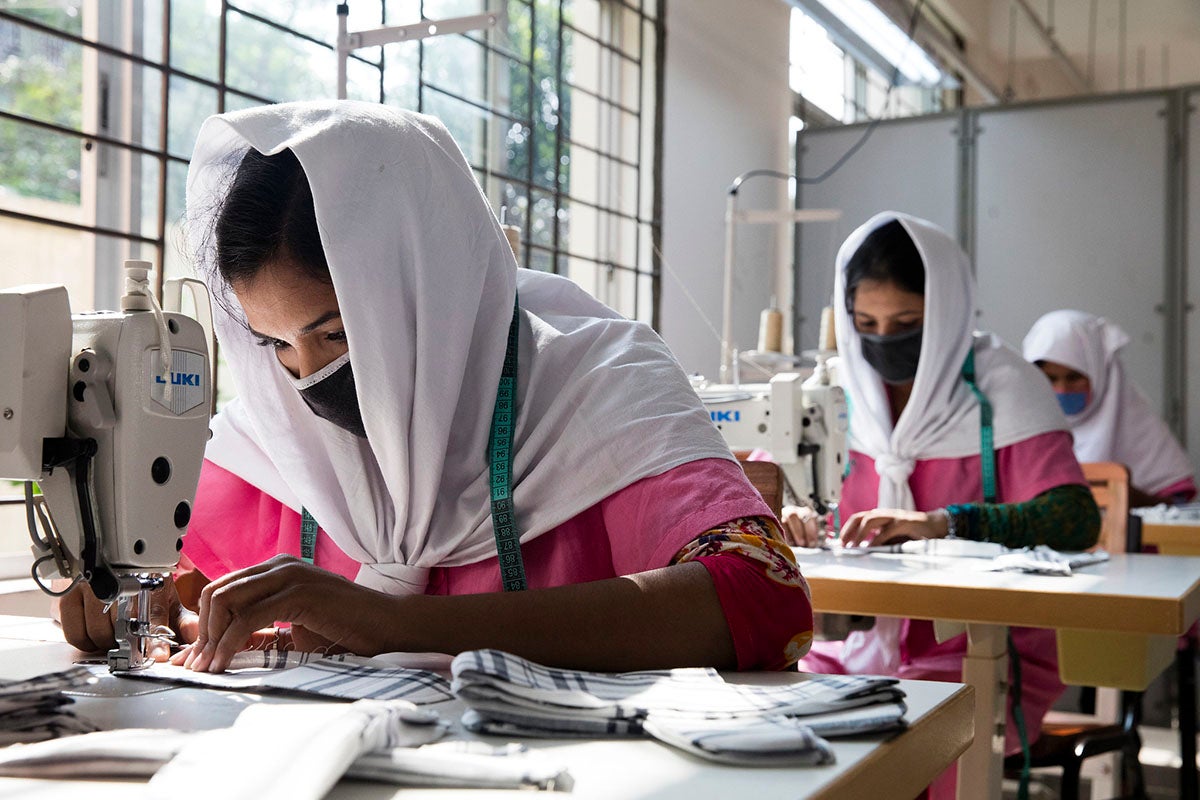 Young Bangladeshi women in training
Young Bangladeshi women in training
Given the economic crises facing many countries amid the coronavirus pandemic (COVID-19), significant impacts on labor market outcomes are expected. While pandemics differ, they invariably affect economic output. The Black Death of 1347-1352 caused more than 75 million deaths around the world, devastating many urban areas, with fewer deaths in rural areas. That led to a reduction in available labor thereby increasing agricultural wages. The Spanish Flu of 1918-1920 caused the deaths of up to 100 million people and curtailed economic activity, with impacts that could be traced into the 1980s.
The impending recession will lead to job losses, lower incomes, and increased poverty. The direct impacts, however, can lead to other short- and medium-term effects that could prove just as painful in the longer run. For instance, job losses affect future earnings due to interruptions, lost productivity, de-skilling associated with prolonged unemployment spells, and missed opportunities to build human capital on the job. Past crises led to earning declines that persisted for several years.
According to human capital theory, educational attainment increases cognitive skills and hence improves labor market outcomes, such as productivity and earnings. Educated workers are better able to cope with the disequilibria brought on by events such as economic crises because they are able to adapt to the changing needs of employers and new technologies. In addition, educated workers are better able to seek information about job opportunities from family, friends, advertisements, former employers, radio and the labor bureau.
The rates of return to education – which is the differential between the price of highly and less educated workers – may rise during crises, since the earnings of those with less education fall because of increased unemployment rates among the less educated. This creates a pool of unemployed less-educated workers, which in turn dampens wages of less-educated workers. If the earnings of the university graduates remain unchanged or change relatively modestly, then the rate of return to university education increases during crises. Also, more educated workers can more easily find other work to maintain earnings. Less educated workers tend to take lower-paying jobs during a crisis, while more advantaged graduates can switch to better jobs more quickly. Employers may be reluctant to lay off educated workers because they are better able to adapt to changing economic conditions.
Several studies have documented the changes in the rates of return before, during and after a crisis. In Argentina, during the volatile periods of 1992-2002, the earnings of educated workers were less affected by crises than the earnings of the less educated workers. Educated workers in Mexico enjoyed larger advantages than less educated ones during non-crisis years, and even larger advantages during crises and recessions. During the recent economic crisis, university educated graduates enjoyed better prospects in the labor market than those with lower educational levels in Greece. And research from Thailand in the crisis of the late 1990s indicates that those with academic secondary education fared better than those with secondary vocational education because of increased number of workers with vocational degrees, and a lack of work opportunities requiring vocational skills during the Asian crisis years.
Workers in agricultural sectors may be more immune to an economic crisis, particularly in countries with more equitable land distribution, because they may be able to produce more food than they consume and are not dependent on other food sellers or that the unemployed in other sectors could be absorbed. Emerging evidence, however, indicates that COVID-19 has caused considerable harm to the incomes of less-educated agricultural sector workers. Workers in manufacturing sectors typically suffer the most during a recession, especially middle-income earners with secondary schooling.
Historical research from the US suggests that the crisis will exacerbate income inequality. During a crisis, middle-income workers (those without university degrees) fare considerably worse than high-income workers (those with university degrees), and this gap continues to widen after the crisis. The low-income workers (those with secondary education only) may suffer less because they offer essential services, and most of them are likely to return to work after the economy begins recovering. So far, low-income workers have been disproportionally affected by COVID-19. The crisis is already leading to increased income inequality according to real time surveys from the UK, US, Germany, Japan and Canada. Employees in Germany, which has a well-established short-time work scheme, are substantially less likely to be affected by the crisis. But in all five countries, the young, less educated workers, women, and minorities are more affected by COVID-19. Poverty rates for those groups are also likely to spike as the labor market performance data in the US and the UK shows a collapse twenty times faster and much deeper than the Great Recession.
Interventions to Counter the Impact of Crises
The literature shows that more educated are more likely to weather economic crisis and shocks better. Several key actions can be taken:
- Maintain government expenditure levels on education: The crisis is expected to lead to budget cuts, and education may lose a lot. Some predict massive budget cuts to education. This will jeopardize the gains we have been making globally in terms of access to education and in the global effort to improve learning outcomes. We may also need to think about incentives for students to remain in school, such as scholarships, conditional cash transfers, and savings programs that encourage study. A lack of investment in education and training will hurt long-term economic prospects and lead to short term losses for students, workers and their families.
- Provide income support and employment: Direct income support and employment for young people are important mechanisms to adopt now. In the past, public works programs have successfully kept young people working. Employing youth during the coronavirus pandemic is a good investment. It helps mitigate the long-term consequences of COVID-19 for labor productivity. Similarly, it makes sense to consider innovative programs such as universal basic income. Several countries had experimented with it previously, and several more are considering it now. Such programs will help low-income and less educated workers get the job experience they need, and give them a cushion during times of unemployment, so that they may also pursue further education and training.
- Invest in digital skills and technology: The unusual and unprecedented nature of the crisis means that it is not only the more educated but also the ones who are in jobs and occupations more amenable to remote work who fare better. In most cases, it ends up being people with digital skills. Therefore, equipping people with digital skills has suddenly become a critical need. Even professions such as elementary school teachers, music teachers, personal fitness trainers, and the likes who may never have needed to connect remotely as a service provider have now had to connect through internet and online. Offering short training courses to improve digital skills will help in this regard. Governments have also started subsidizing internet access or providing low-cost computers for those without access to technology.
All three actions are needed. All three also encourage continued investment in education so that education levels will rise.




Join the Conversation